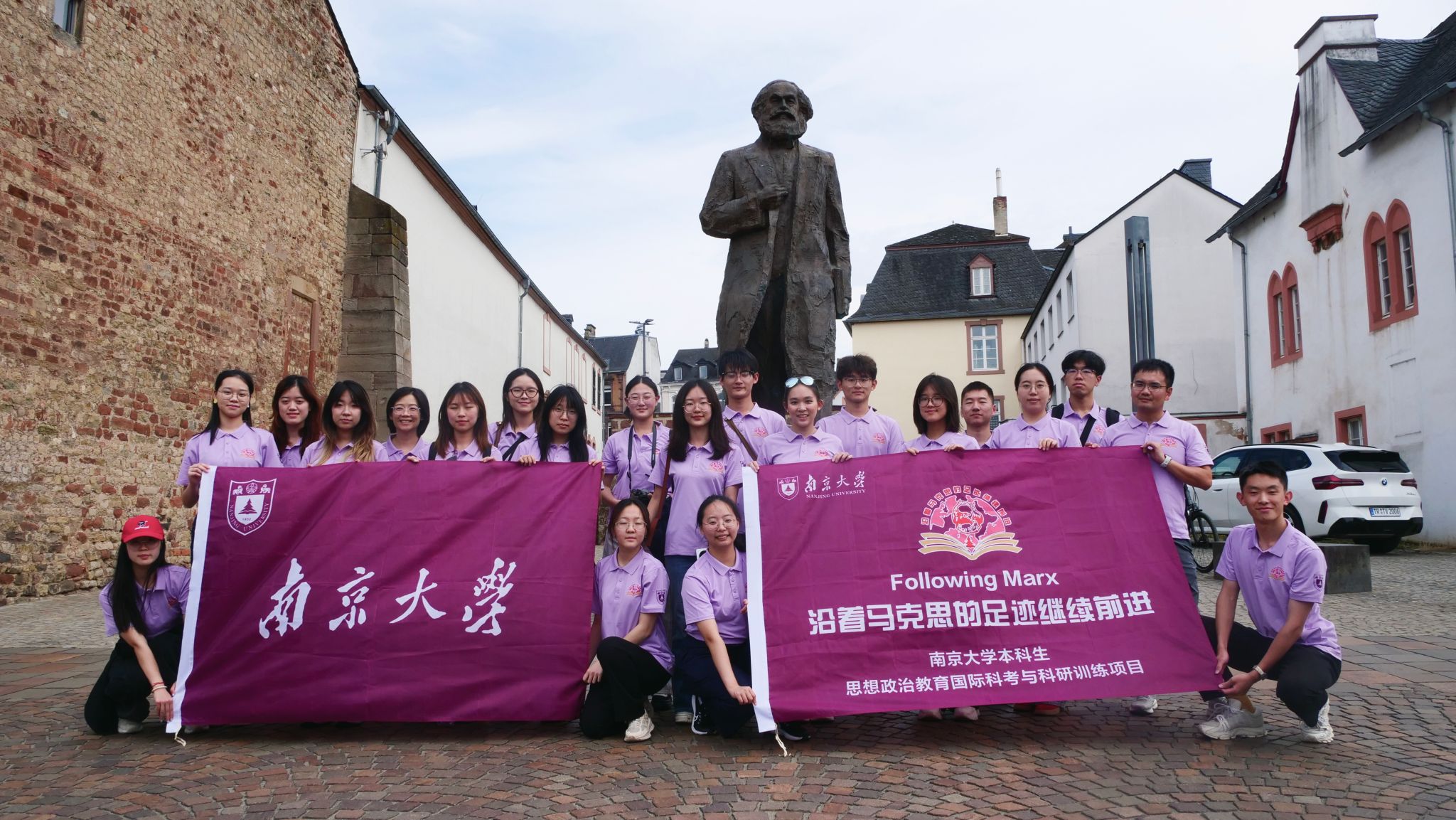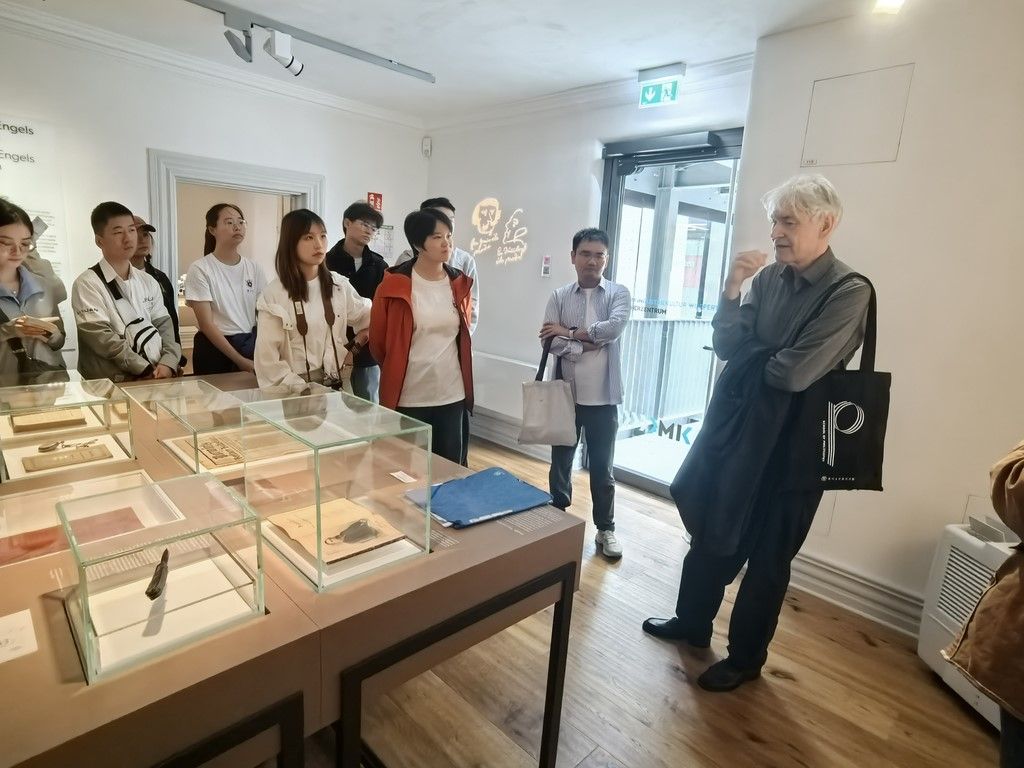To thoroughly implement the fundamental task of fostering virtue through education and guide contemporary youth to deepen their belief in Marxism while expanding their global perspectives, Nanjing University's School of Marxism successfully conducted the 2025 "Following Marx" undergraduate ideological and political education research expedition and training program. The expedition team consisted of 21 undergraduates from eight different schools at NJU, including the School of Marxism, School of Liberal Arts, School of Philosophy, School of Journalism and Communication, Law School, School of Government, School of Social and Behavioral Sciences, and Nanjing-Helsinki Institute, all under the guidance of multiple faculty members from the School of Marxism.
From July 14 to 20, 2025, the team set out from Trier, Marx's birthplace, proceeded to Wuppertal, the hometown of Friedrich Engels, delved into Essen and Cologne, witnesses of the Industrial Revolution, and finally arrived in Berlin, a renowned center of intellectual thought. Employing diverse forms including museum studies, street surveys, academic dialogues, and impromptu seminars, the students achieved a deep integration of theoretical understanding and practical insights at the historical sites of the birth and development of Marxism.

Preparations: Intensive Training from the Library to the Field
"Traditional ideological and political courses mainly focus on theoretical instruction within the classroom. However, Marxism itself emerged from profound social observation and revolutionary practice", said Li Qiankun, Deputy Dean of the School of Marxism and project leader, explaining the original intention behind the project design. "We hope that by visiting the places where Marx and Engels lived, thought, and fought, students can engage with historical currents, feel the dynamism of ideas, and deepen their understanding of the achievements of the Sinicization of Marxism."
Team members underwent rigorous selection. The selection process considers not only their academic foundation but also research potential and cross-cultural communication skills. Selected students participated in intensive pre-departure training covering contemporary international Marxist studies, Marx's life and texts, modern Sino-German relations, the creation and international dissemination of The Communist Manifesto, and its contemporary value. "Thorough preparation is key to ensuring the depth and effectiveness of the expedition", emphasized Li Qiankun. "We required each student to embark on specific research questions, transforming the trip into a purposeful, profound academic exploration." The preparatory sessions immersed students in the core tenets of the Marxist scientific worldview and methodology, equipping them for insightful and critical engagement during their fieldwork. The meticulously designed itinerary focused on three core themes: Tracing Intellectual Roots, Recreating Historical Contexts, and Engaging in Contemporary Dialogue.
Tracing Intellectual Roots: Connecting with the Masters' Legacy
In Trier's old town, students keenly observed the city's complex relationship with its famous son from ancient historical buildings to the traffic light figures with the image of Marx. The Karl Marx House Museum, with its 13 exhibition halls, provided a vivid "first lesson." The diverse cultural representations and interpretations of Marx displayed offered students rich, multifaceted perspectives. An impromptu seminar comparing Chinese and German portrayals of Marx sparked lively discussion right in front of the Marx statue.
Moving to Wuppertal, in front of the statue of Engels in his former residence, students delved into his multifaceted identity as a revolutionary and thinker through prepared commentary by team members, while also sensing his profound bond with Marx. Professor Smail Rapic from the University of Wuppertal provided detailed insights into artifacts and shared anecdotes about the great thinkers. He engaged the students in deep discussions on topics like "The Current State of Marxist Studies in Germany" and "The Global Significance of Chinese Modernization."

Recreating Historical Contexts: Exploring the Reality Behind the Critique
Leaving the masters' hometowns, the team journeyed into the heartland of the 19th-century Industrial Revolution—Essen and Cologne—walking through time into the depths of history. At the Ruhr Museum, housed in a former coal washing plant, colossal machinery, extensive mineral specimens, and historical imagery poignantly depicted the harsh realities faced by the working class. "Standing before models of cramped miners' workspaces and poring over historical documents of the labor movement, abstract concepts like 'alienated labor' and 'surplus value' from textbooks suddenly became concrete and deeply impactful", wrote one student in their research log. Blending past and present amidst modern traffic, the team gathered at the former headquarters of the Neue Rheinische Zeitung (New Rhenish Newspaper), analyzing how Marx's editorship profoundly shaped his ideological evolution and revolutionary practice, and examining why Cologne became a revolutionary stronghold.
Engaging in Contemporary Dialogue: Listening to Echo of Marxism
The research team's trip to Berlin focused on the contemporary vitality of Marxism in this major center of German Marxist studies. Walking from Marx-Engels-Platz to Humboldt University, Professor Rolf Hecker provided on-site instruction. Walking and listening, Marx's student journey and current scholarly frontiers in Germany became tangible. A visit to the Humboldt Forum, with its vast collections, prompted deep reflection on global history and culture. The team also visited the Rosa-Luxemburg-Stiftung. Dr. Hauke Neddermann explained the open and historical approach behind the Historisch-kritisches Wörterbuch des Marxismus (Historical-Critical Dictionary of Marxism). Dr. Frank Engster delivered a lecture on "The Theoretical Traditions and Evolution of Western Marxism in the 20th Century", exploring how European thinkers reinterpreted Marxist theory amidst profound historical shifts. These sessions offered invaluable international perspectives on Marxism's complex evolution in the modern world.


Integrating Knowledge and Action: Research and Growth on the Move
Despite demanding schedules, the team held nightly internal debriefing and discussion sessions. "What we see and hear during the day must be processed, digested, and debated immediately in the evening", stressed Cheng Wenxia, a faculty leader. Students actively shared observations and insights, delving into how to more effectively communicate explain the Chinese adaptation of Marxism which is adapted to the Chinese context and the needs of our times to the world, thereby solidifying their understanding and convictions through investigation and reflection.
Beyond observation and listening, the students were active researchers. Divided into five groups based on academic interests (The Communist Manifesto's core ideas, contemporary representations of Marx and Engels, Marxism's dissemination in China, social revolution and state governance, key issues in contemporary capitalism), they conducted street interviews at various locations. "Excuse me, do you know about Karl Marx? What image comes to mind when you think of him?" On the streets of Trier and beside the subway stations in Berlin, the students bravely communicated with local residents in German or English.
"Interviews were not always easy; we sometimes encountered indifference or puzzlement", admitted Song Zhengyuan, a student responsible for social surveys. "Yet, it is these real, sometimes even unexpected responses that give us a clearer picture of the current understanding of Marxism in Western society, providing our research with firsthand vivid material and a cross-cultural comparative perspective. This has a much greater impact than simply reading book materials." The collected primary data will serve as a vital reference for subsequent thematic research.
Returning Enriched: The Spark of Thought Illuminates the Path Forward
The immersive fieldwork, dialogues with international scholars, continuous team discussions, and independent research profoundly deepened the students' understanding of Marxism's theoretical essence, historical evolution, and complex position in today's world. "Seeing various editions of The Communist Manifesto in Trier, feeling the suffering and struggle of the working class at the Ruhr Museum, listening to European scholars interpret Marxism in contemporary Berlin... This vividly showed me that Marxism is a living theory that must be continuously understood, developed, and applied in practice", shared team member Yang Yan.
As the Berlin visit concluded, Nanjing University's 2025 "Following Marx" Global Undergraduate Research Expedition drew to a successful close. Xia Juan, Deputy Party Secretary of the School of Marxism and program leader, summarized: "This was a profound journey tracing the roots of thought and a vivid lesson in understanding our national context. Standing on the European mainland and reflecting on China's development path, the monumental achievements of socialism with Chinese characteristics and the potent vitality of Marxism they demonstrate became the students' profound source of conviction. This kind of internally generated confidence is difficult to fully obtain in the classroom."
The journey of intellectual inheritance and practical innovation is endless. This "walking ideological and political course", embodying the innovative concept of breaking classroom boundaries and grounding education in practice, empowers young students to transform field experiences into profound interdisciplinary research and learn how to vividly tell China's stories. It serves not only as on-the-ground verification of Marxism's truth but also, through the effective education of combining theoretical analysis, perceptual understanding, and practical experience, naturally fosters the Four-sphere Confidence in the hearts of the youth, inspiring students to shoulder the mission of inheriting the achievements of the Sinicization and modernization of Marxism with a more resolute stance, allowing the footprints of truth to continue extending through the practice of a new generation.
